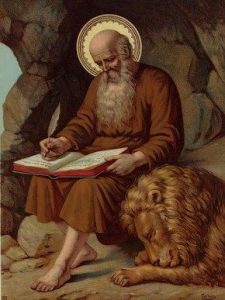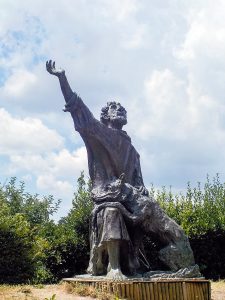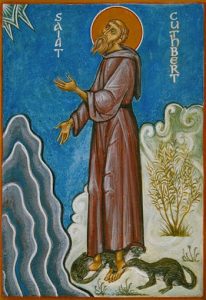While reading a book I came across the concept of “desert fathers.” Being wholly unfamiliar with the phrase, I asked Doctor Internet, and down the rabbit hole I went.
The trail of hyperlinks sent me on an increasingly interesting trail. It began with a definition of the desert fathers, then quickly spun into tales and legends. A pattern began to develop that turned my thoughts to RPGs:
An Adamic closeness to animals was a charism of the Desert Fathers.
This quote is pulled from the footnotes of the book The Ladder of Divine Ascent by John Climacus (see below). “Closeness to animals…”? Could this be like like animal companions or familiars? So from there I hunted down a handful of these tales. Are they factual? Are they legend?
I don’t know, but they are fun real world analogues to our animal companions in our favorite RPG systems.
[bs_smart_list_pack_start][/bs_smart_list_pack_start]
Saint Jerome
 As the tale goes, one day a lion entered the monastery in which Jerome resided. All of his fellow monks quickly evacuated, but Jerome rolled super high Perception and noticed the animal appeared to be in pain. He found some swelling on one of the paws, located an embedded thorn, and removed it from the ailing lion. Some of the stories even go so far as to state that he then created a poultice and treated and bound the wound!
As the tale goes, one day a lion entered the monastery in which Jerome resided. All of his fellow monks quickly evacuated, but Jerome rolled super high Perception and noticed the animal appeared to be in pain. He found some swelling on one of the paws, located an embedded thorn, and removed it from the ailing lion. Some of the stories even go so far as to state that he then created a poultice and treated and bound the wound!
After receiving the help from Jerome, the lion seemed content to just live with the guy. The lion is even storied to have returned a lost donkey of Jerome’s after hunting down its captors!
Saint Francis of Assisi
A wolf had moved into the region just outside of the city of Gubbio. It had killed a shepherd, a couple of townsfolk, and even a few armed guards who had been sent out to kill it.

With every slaying, the wolf’s reputation and size grew within the city of Gubbio.
The mayor soon after sent for Saint Francis of Assisi because he’d heard that he could talk to animals. Upon encountering the beast outside of the city, Saint Francis promised him no harm and began to commune with the wolf (Speak with Animals, anyone?), asking why he’d killed the people of Gubbio.
As it turns out, the wolf had no ill will towards the people. He was just injured, unable to keep up with his pack or take down larger prey, and so had resorted to sheep. The shepherd, of course, protected his flock. His death and all the others were only the result of him defending himself.
Armed with the wolf’s side of the story, Saint Francis mediated an arrangement wherein the citizens of Gubbio would promise no harm to the wolf just as the wolf would promise no harm to them so long as they kept him fed, and the wolf would in turn help protect the city.
Paul the Hermit (Paul of Thebes)
Paul was an ascetic who lived in the deserts near Egypt for 90+ years. It is said that he subsisted on fruit and half a loaf of bread that was delivered to him everyday by a raven–presumably because of Paul’s faith and incessant prayers.
Late in Paul’s life, Saint Anthony the Great, another Christian monk in the region, was sent a message from God that there lived another monk in the wilderness nearby; one “more excellent than you.” Saint Anthony made the pilgrimage and communed with Paul just before he died. When Saint Anthony went to bury Paul’s body, two lions approached and dug the grave with their claws.
Stephen
Not much is known about this Stephen (at least not that I could track down) besides a short paragraph devoted to him in the John Climacus book quoted above. In it, Climacus recounts the dying days of the monk, describing him as one who had “tears and fasting adorn[ing] his soul.”
He was apparently tormented by a spirit in those final days and Climacus couldn’t quite wrap his mind around how one such as Stephen had come to suffer such a fate. He writes,
Where, then, was the voice of Ezekiel, to say to the tormenter: “I will judge you as I find you, says God” (Ezekiel 33:13-20)? He was truly unable to say such a thing. And why was that? Glory to Him who alone knows, and this was a man who had reared a leopard by hand in the desert, or so I was solemnly told.
So Climacus used Stephen’s supposed connection with a leopard as a defense for his purity!
Pachomius
Pachomius is considered the founder of communal living for monks (cenobitic Christian monasticism). Tradition holds that he was a friend to animals, and there are artistic depictions of him ferrying across the Nile River while standing on the back of a crocodile.
Again the belief is that the animal’s reception and treatment of Pachomius proved his unique holiness.
Saint Cuthbert
 Saint Cuthbert had a habit of taking long walks on the beach in the middle of the night, so a fellow monk of his tailed him one night to see what he was up to. As it turns out, Cuthbert would walk into the sea until only his head remained above the waters and would sing psalms and pray until the sun rose signaling the next day.
Saint Cuthbert had a habit of taking long walks on the beach in the middle of the night, so a fellow monk of his tailed him one night to see what he was up to. As it turns out, Cuthbert would walk into the sea until only his head remained above the waters and would sing psalms and pray until the sun rose signaling the next day.
The peeping monk waited around until Saint Cuthbert emerged from the waves and saw him pause once more on the shore and engage in prayer. That’s when he saw two otters scurry over to the monk and warm and dry his freezing wet feet with their fur. He is thusly remembered as the patron saint of otters!
Abba Macarius
Abba Macarius lived at the same time as Paul of Thebes and Saint Anthony the Great. In fact, he was taught the ways of monasticism by Saint Anthony! During his time in the desert, legend has it that a hyena (Gnoll?) approached him one evening during his prayers. It licked his feet and even took his tunic in its mouth and led him from his cave to its own.
Upon arrive there, he found a litter of cubs that had all been born blind. He healed them with a prayer and she rewarded him with the skin of a large ram. Loot!
[bs_smart_list_pack_end][/bs_smart_list_pack_end]
Even if not a single one of these accounts is factual, there mere existence speaks to the power and perception of the connection between man and animals.
It’s no small wonder, then, that our modern RPG systems allow for such partnerships between the two!

